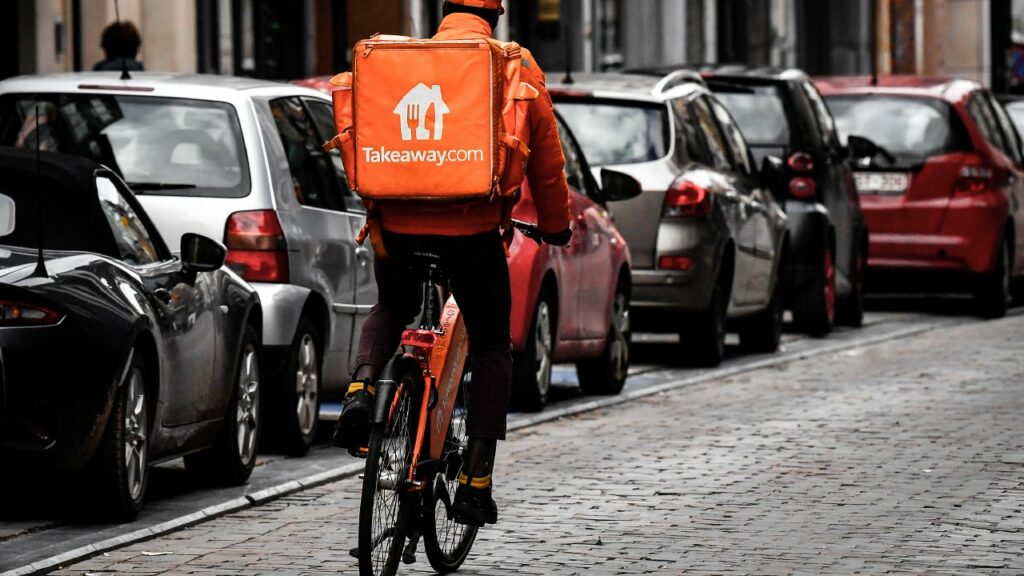Five of the largest platform companies in Belgium do not offer fair working conditions, according to a new study from the Fairwork Belgium project, conducted at the KU Leuven Centre for Sociological Research and in collaboration with Oxford University.
The study assessed the working conditions of Takeaway, Ring Twice, Deliveroo, Yoopies and Top Help.
“Workers on these platforms reported dire conditions, including sub-minimum wage pay, unclear contracts and a lack of access to collective representation mechanisms,” researchers found.
Platforms ignore existing regulations, leading to unpaid work
Their study is the first to score and rank the working conditions of platforms in the food delivery and care sectors in Belgium against the five principles of fair work: fair pay, fair conditions, fair contracts, fair management and fair representation.
Takeaway, which is the only platform analysed that offers employment contracts, scored 6 out of 10. Ring Twice, a Belgian start-up, came in second with 4 points. The other platforms scored either 1 point (Deliveroo) or 0 points (Yoopies and Top Help).
“Our research reveals how care platforms tend to ignore existing regulation and instead end up stimulating informal work, resulting in a consequent amount of unpaid work undertaken by workers in the form of unsecured minimum wages and lack of social security coverage,” said Valeria Pulignano, professor of sociology at the University of Leuven.
The report's findings indicate that despite clear regulations and the strong presence of trade unions in Belgium, digital platform workers tend to fall outside the scope of sectoral collective bargaining agreements, with serious repercussions on working conditions.
Wage dumping, risky conditions and limited rights to collective representation
Some of the study’s main findings include that only two platforms (Takeaway and Ring Twice) guarantee a minimum wage after expenses.
Just one platform (Takeaway) was able to demonstrate that it offered protection against work-related risks.
Three out of six platforms – Deliveroo, Ring Twice and Takeaway – could demonstrate that they offer clear, transparent and accessible terms and conditions. Only Ring Twice and Takeaway demonstrated that decisions about workers were made through due process.
Remarkably, none of the platforms complied with the principle of fair representation, which means that Belgian platform workers do not have institutional channels to influence decisions that affect their employment.
Related News
- Rideshare platforms oppose EU directive to improve worker conditions
- Self-employed should have right to improve working conditions, say MEPs
“Despite the efforts of some platforms, the low scores of the five platforms assessed indicate that regulatory reform and enforcement are imperative,” researchers said. “However, the range of scores shows that poor working conditions are not inevitable. Platform work can also be fair work.”
Their first report hopes to establish a baseline on the current state of the platform economy in Belgium. Fairwork Belgium plans to continue studying the development of platform work and to update its assessments on an annual basis.
They will present these first findings to an expert panel including members of the European Parliament and European Commission on 6 April.
Deliveroo says research is 'biased, flawed'
Deliveroo reacted to news of the report with surprise, saying they were in contact with researchers and had provided them with information explaining their working conditions and policies.
Spokesperson Rodolphe Van Nuffel told The Brussels Times that Fairwork had not yet shared their full findings with them, "but it is clear that this flawed piece of academic research is based on inaccurate evidence and pre-determined, ideological bias. The scoring does not reflect the current legislation, nor the outcome of court cases, confirming riders are self-employed. The scoring is only made with a view that [traditional] employment is what should be offered, which riders told us they explicitly do not want."
Deliveroo, like other platform companies, cites results from in-house surveys of their workers in which they express a desire to remain independent contractors without access to social rights or labour protections.
"Thankfully, what is deemed attractive, fair work is not determined by academic research, but by individuals themselves, the riders. Rider satisfaction remains at record levels, and record numbers are waiting to onboard as riders, demonstrating the attractiveness of the flexibility and protections which working with Deliveroo provides."
Van Nuffel pointed to some of their efforts at improving working conditions for their couriers, including "road safety training, market leading personal accident insurance, third party liability insurance, free safety kit, free COVID masks and COVID payments, and new sickness insurance and childbirth payments worth €1000."
Note: This article has been updated to include a reaction from Deliveroo.

